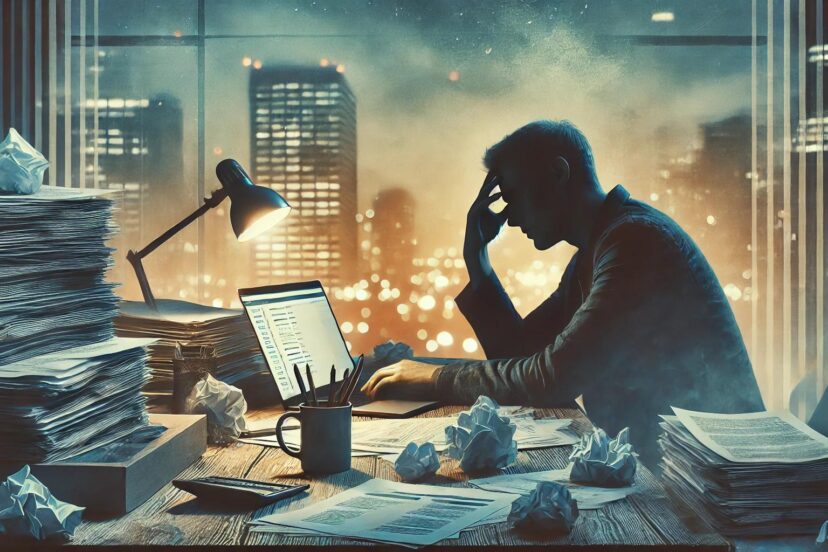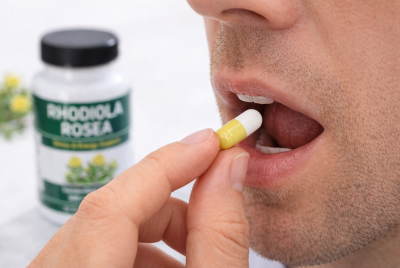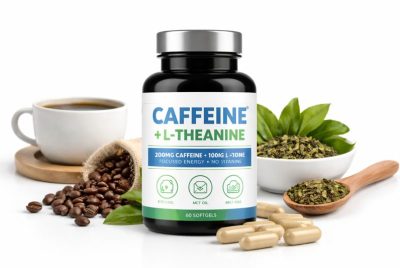Best Nootropic for Energy: Mental Exhaustion vs. Physical Fatigue
We may earn a commission for purchases made using our links. Please see our disclosure for more details.
Life can be challenging, right? Sometimes, with all the endless demands, it can leave us feeling utterly spent. But what’s the reason you’re running on fumes? Maybe your mind is exhausted or your body is dead tired. It’s easy to confuse these two but understanding the difference between mental exhaustion and physical fatigue can make a difference. You’ll then know how to regain your energy and spark! So, in this guide, you’ll learn about the signs, the triggers, and the best nootropic to get you back to vitality. Let’s dive in!
What Is Mental Exhaustion?
Have you ever felt so tired both mentally and emotionally? As if you’re already drained midday and can’t cope with your daily life. Well, that’s what mental exhaustion is. It usually happens after constantly buzzing with activity (like work, study, social unrest). After the storm, you’re left feeling overwhelmed. Mental exhaustion is a state where your thoughts feel tangled, decisions feel impossible, and joy seems a distant memory. It’s not just tiredness; it’s a deep, cerebral weariness that makes even simple tasks feel monumental.
What Is Physical Fatigue?
Now, on the other hand, physical fatigue feels like you lack the energy to do your normal activities. Your body is a vessel carrying you through marathons of work, family, and life. Physical fatigue is like reaching the last mile of a grueling race: your muscles ache, your limbs feel like lead, and every step is an effort. It’s your body’s clear and insistent way of saying, Enough. The cause? Lack of sleep, too much stress, or even medical conditions.
Key Differences Between Mental and Physical Fatigue
The distinction lies in where the exhaustion strikes. Mental fatigue hijacks your mind, clouding your ability to think or feel. Physical fatigue, however, is rooted in your body, manifesting as sluggishness and physical inability. But the two aren’t solitary—they’re dance partners, often pulling each other onto the floor.

Signs of Mental Exhaustion
- The inability to concentrate, no matter how hard you try.
- Forgetfulness that makes you question your own mind.
- A shorter temper than usual, snapping at small things.
- Feeling emotionally hollow, like a drained battery.
- A constant undercurrent of worry that never switches off.
Does this sound like a day in your life? It might be your brain’s SOS signal.
Signs of Physical Fatigue
- Muscles that protest with every movement.
- Limbs that feel heavier than they should.
- Struggling with tasks you used to breeze through.
- Waking up tired, even after hours of sleep.
- An overarching sense of physical inertia.
If this resonates, your body might be waving its own white flag.
Can They Overlap?
Unfortunately, the answer is yes… They’re like a pair of mischievous twins. Mental exhaustion often seeps into physical fatigue, leaving you feeling utterly spent, while prolonged physical strain can drain your mental reserves. The mind and body, though distinct, share a profound connection, and when one falters? Well, the other often follows.
The Link Between Mental Fatigue and Physical Performance
Mental fatigue doesn’t just affect your brain—it can take a toll on your physical abilities too. Research published in BMC Neuroscience highlights how prolonged cognitive tasks impair alertness and slow reaction times. Similarly, a review in Sports Medicine found that mental fatigue increases the perception of effort during physical activities, reducing endurance and overall performance. These studies demonstrate the intricate connection between mental and physical energy reserves, emphasizing the need for balance and recovery.
Common Causes of Mental Exhaustion
- Endless workdays without a breather.
- A life devoid of stillness and downtime.
- Emotional upheavals that refuse to relent.
- Chronic sleep deprivation.
- The weight of too many choices to make.
Ever feel like a hamster on a wheel, running but going nowhere? That’s mental exhaustion’s telltale sign.
Common Causes of Physical Fatigue
- Pushing your body too hard, too often.
- A diet that’s more fast food than fresh fare.
- Sleep patterns that resemble a seesaw.
- Underlying health issues that drain you.
- A sedentary lifestyle that saps energy instead of preserving it.
Your body is a symphony—it needs balance and care to play its best tune.
The Role of Sleep in Fatigue
Sleep is the great equalizer, the healer of both mind and body. Skimping on those precious 7–9 hours is like leaving your phone unplugged overnight—it simply won’t function. I mean, could you? Because I can’t focus when I’m sleep-deprived! Guard your sleep as you would a treasure; it’s the cornerstone of vitality.
Nutrition: Fuel for Your Body and Brain
Food isn’t just fuel; it’s medicine. A balanced diet brimming with whole grains, lean proteins, fresh produce, and healthy fats acts like premium gasoline for your mind and body. Skip the junk (chips, lots of sweets, alcoholic beverages), and fatigue will likely be your unwelcome guest.
Best Nootropic Supplements for Mental Clarity
Nature offers its own brain boosters: ginseng to invigorate, omega-3s to sharpen, and L-theanine to calm the storm. Think of these nootropics as gentle nudges for your mind, helping you reclaim focus and serenity. Want to learn some cool facts about the human brain? Check our article on the impact of nootropics supplements.
Best Nootropic Products to Fight Fatigue
When it comes to battling fatigue, incorporating the best nootropic products into your routine can make a significant difference. Here are some top recommendations:
1. Omega-3 Fish Oil Supplements
Packed with essential fatty acids like DHA and EPA, omega-3 supplements are well-known for their ability to support brain health. They help reduce mental fog, improve focus, and promote overall cognitive function. A daily dose can be especially beneficial for those experiencing mental exhaustion.
2. L-Theanine Supplements
L-Theanine, commonly found in green tea, is a natural nootropic that promotes relaxation without causing drowsiness. It enhances focus, reduces stress, and pairs well with caffeine for an added boost in mental clarity.
3. Ashwagandha Powder
This ancient adaptogen is celebrated for its stress-reducing properties. Ashwagandha not only helps manage anxiety but also supports cognitive function by lowering cortisol levels, making it ideal for combating mental and physical fatigue.
4. Rhodiola Rosea Extract
This adaptogen is known for its ability to combat fatigue, increase energy, and improve mental performance. Rhodiola is particularly effective for managing stress-induced exhaustion.
5. Bacopa Monnieri
An herbal nootropic, Bacopa Monnieri boosts memory retention, reduces anxiety, and improves attention span, making it a powerful tool against mental fatigue.
Incorporating these products into your daily routine can give you the physical and mental boost you need to stay energized and focused.
Physical Activity: A Double-Edged Sword
Exercise is a paradox—it can invigorate or exhaust. Gentle movements like yoga or a brisk walk can be your ally, but pushing too hard can backfire. Listen to the whispers of your body before they become shouts.
How to Recharge Mentally
- Pause and Breathe: Step away from the grind, even for a moment.
- Embrace Mindfulness: Let meditation be your sanctuary.
- Set Limits: Sometimes, no is the most liberating word.
How to Recharge Your Body
- Prioritize Rest: Allow your body to rest and relax properly.
- Hydrate: Water is life—don’t skimp on it.
- Stretch It Out: Loosen tight muscles and release built-up tension.
The Power of a Routine
A harmonious routine is your ally against fatigue. It might be hard at first but be consistent and it will be second nature! Regular sleep, nourishing meals, the best nootropic, physical activity, and moments of joy create a rhythm that sustains you.
When to Seek Professional Help
Sometimes, fatigue is a whisper of deeper issues—anemia, thyroid imbalances, or depression. If rest and routine don’t restore you, it’s time to consult a professional. Please don’t ignore what you’re body is telling you. If the best nootropics aren’t working pretty well, then it’s time to have yourself checked by a healthcare professional.
Preventing Burnout: The Long Game
- Plan Ahead: Spare yourself last-minute chaos.
- Honor Self-Care: Protect time for the things that light you up.
- Lean on Community: A strong network makes the heaviest burdens lighter.
Mental Exhaustion vs. Chronic Fatigue Syndrome
The difference? Chronic fatigue syndrome is a persistent medical condition requiring expert care. Mental exhaustion, on the other hand, typically responds to lifestyle changes and self-compassion.
Role of Technology in Fatigue
Screens, though indispensable, can be relentless thieves of energy. Set boundaries—your brain will thank you. Don’t underestimate the power of the screen because boy oh boy, it can mess with your sleep! Thank me later!!!
Small Wins Lead to Big Gains
Start small. No rush!!! A glass of water, a walk around the block, a single moment of mindfulness, a does of the best nootropic. Each step forward is progress. The first step is usually the hardest but you can do it!!! Just think about your mind and body goals.
Conclusion
You don’t have to live in the shadows of exhaustion. With the best nootropic, not anymore! Recognize the signs, embrace the solutions, and step into a life where energy and joy are abundant. Because you, my friend, deserve nothing less. Cheers to a more energetic you!
FAQs
1. How can I tell if I’m mentally exhausted or physically fatigued?
Pay attention to where the struggle lies. If focusing feels impossible or emotions seem out of reach, you’re likely mentally exhausted. If it’s your body that’s dragging, with heavy limbs or muscle weakness, physical fatigue is the likely culprit.
2. Can mental exhaustion lead to physical fatigue?
Absolutely—it’s like a domino effect. When your brain is constantly on overdrive, it drains the energy reserves your body relies on, leaving you feeling wiped out in every sense.
3. Are there natural ways to combat mental exhaustion?
Yes! Practices like mindfulness, taking regular breaks, and incorporating natural nootropics like omega-3s or ginseng can give your brain the recharge it craves.
4. What foods fight fatigue?
Think of foods that fuel and heal: whole grains, lean proteins, vibrant fruits and vegetables, and healthy fats like avocado or nuts. These nourish both your body and your mind.
5. When should I see a doctor about fatigue?
If your tiredness lingers for weeks despite rest, or if it’s paired with other concerning symptoms like unexplained weight changes, persistent sadness, or physical pain, it’s time to seek medical advice.




